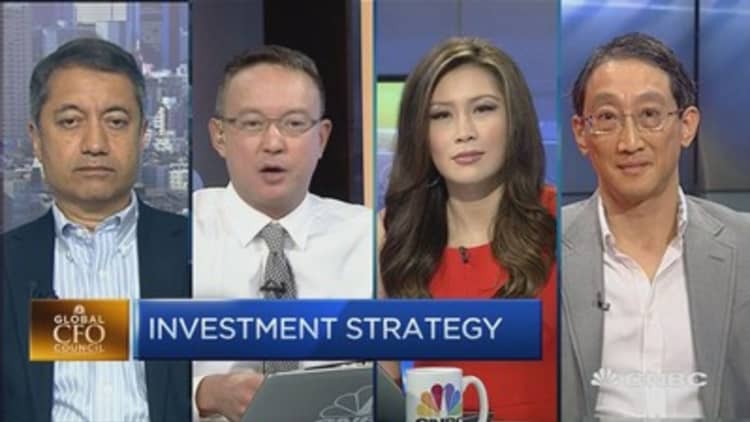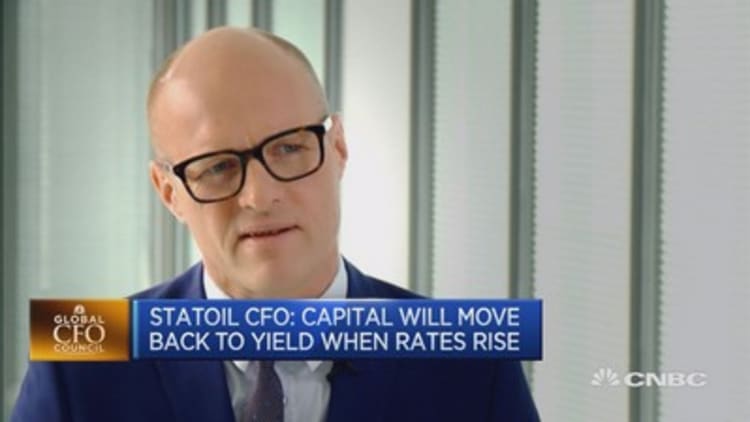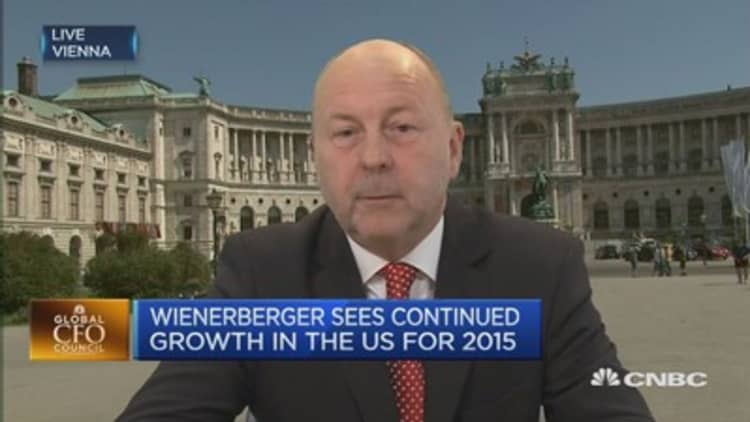


Chief financial officers from around the globe are betting on a rebound for the U.S. economy in the next six months but expect a rocky patch for equity markets ahead of a rate hike by the U.S. Federal Reserve later this year.
A survey of 51 chief financial officers (CFOs) from Europe and Asia by CNBC has revealed that the majority believe that the U.S. and Canada will be the world's economic powerhouse. Of those surveyed, 44.4 percent said that the region would lead the way other the next six months, dwarfing other regions like China which received just 27.7 percent of the vote.
The survey's findings come in spite of gross domestic product in the U.S. expanding by just a 0.2 percent annual rate, according to data by the Commerce Department at the end of last month. That marked the weakest reading in a year and was way below market expectations with many blaming the cold weather during the period for much of the east coast.
The findings tally with the thoughts of many market analysts like Peter Oppenheimer, chief global equities strategist at Goldman Sachs. He remains upbeat on the U.S., despite the soft data, and told CNBC on April 30 that he expects a "reacceleration" after this "temporary slowdown."
The chief financial officers might see improving growth for the country but are cautious on U.S. equity markets which have been trading sideways after a six-year bull run. Sixty-one percent of respondents said a "significant stock market correction" in the U.S. was "somewhat likely" in the next three months, with one respondent estimating that it was "extremely likely."
The S&P 500 index has logged gains of just 1.7 percent so far this year amid concerns that the benchmark has grown overvalued compared to its European counterparts which have seen stellar gains on the back of aggressive monetary policy by the European Central Bank (ECB). However, 60 percent of the European respondents in the survey were also fairly concerned on their own local stock markets, predicting that it was "somewhat likely" that a significant correction could also happen in Europe in the next three months.
For the U.S., the path of equity markets usually boils down to the monetary policy of its central bank, the Federal Reserve. Benchmarks, led by the , have been on what seems like a never-ending bull run since 2009, with many economists crediting the aggressive monetary policy put in place by the Fed for the push higher. Its main benchmark rate - which prices all sorts of loans and mortgages in the U.S. - has been at record lows and it finished its third bond-buying program last year.
The Fed now looks likely to start to raise rates this year, which is seen by many as being behind the stalling of the bull run. But market participants remain divided over when the first move by the Fed might come. The CNBC CFO survey saw 44.4 percent of respondents say they thought a Fed hike would come in the fourth quarter of this year. Just over 16 percent estimated that it would come earlier, in the third quarter of this year, and the same amount expected it to be put back to the first quarter of 2016.
Torgrim Reitan, the chief financial officer of Norwegian oil major Statoil, told CNBC that the U.S. remained really important for the global economy, and said that firms must be prepared for a rapid change.
"I think we must be expected for quick shifts when they first happen," he said. "History shows that the changes in the interest rate market happens rapidly."
Willy Van Riet, the CFO of brick producer Wienerberger, told CNBC that his company has been using this environment of low interest rates to lend in the bond markets and increase its "base financing".
However, he also said that Wienerberger had been able to lower its overall debt levels and spoke of the benefits of being flexible with its debt issuance if interest rates were to rise.
"Everybody has to be prepared for changes and we know changes are coming," he said. "To change the whole ball game is something you can't do as a company, you have to live with it."
Fed members have altered their tone in recent meetings and have gone back to concentrating on economic data, rather than trying to detail a roadmap for investors. Chicago Federal Reserve President Charles Evans told CNBC on Thursday that the Fed should push any interest rate hike into next year, despite expecting a rebound in the economy in the second quarter and the rest of 2015.
Evans is a voting member this year on the central bank's policy committee and among the most dovish. "Accommodation is helping the economy move up," he told CNBC's "Squawk Box" in an interview. "And if inflation were to pick up more strongly than I'm expecting, we know how to deal with that, we can increase rates."






